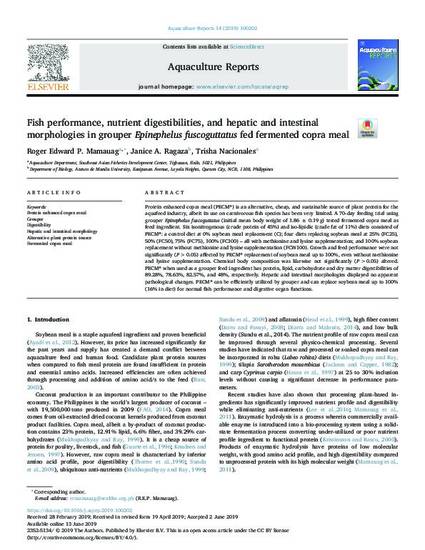
Protein enhanced copra meal (PECM®) is an alternative, cheap, and sustainable source of plant protein for the aquafeed industry, albeit its use on carnivorous fish species has been very limited. A 70-day feeding trial using grouper Epinephelus fuscoguttatus (initial mean body weight of 1.86 ± 0.19 g) tested fermented copra meal as feed ingredient. Six isonitrogenous (crude protein of 45%) and iso-lipidic (crude fat of 11%) diets consisted of PECM®: a control diet at 0% soybean meal replacement (C); four diets replacing soybean meal at 25% (FC25), 50% (FC50), 75% (FC75), 100% (FC100) – all with methionine and lysine supplementation; and 100% soybean replacement without methionine and lysine supplementation (FCW100). Growth and feed performance were not significantly (P > 0.05) affected by PECM® replacement of soybean meal up to 100%, even without methionine and lysine supplementation. Chemical body composition was likewise not significantly (P > 0.05) altered. PECM® when used as a grouper feed ingredient has protein, lipid, carbohydrate and dry matter digestibilities of 89.28%, 78.63%, 82.57%, and 48%, respectively. Hepatic and intestinal morphologies displayed no apparent pathological changes. PECM® can be efficiently utilized by grouper and can replace soybean meal up to 100% (16% in diet) for normal fish performance and digestive organ functions.
